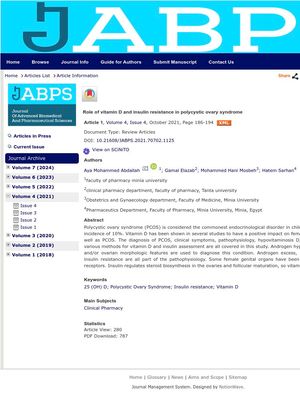Role of Vitamin D and Insulin Resistance in Polycystic Ovary Syndrome
October 2021
in “
Journal of Advanced Biomedical and Pharmaceutical Sciences
”

TLDR Vitamin D helps improve PCOS by aiding insulin function and ovarian health.
Polycystic ovary syndrome (PCOS) is the most common endocrinological disorder in women of childbearing age, affecting 10% of this population. The study covers the diagnosis, clinical symptoms, pathophysiology, hypovitaminosis D, insulin resistance, and the various methods for vitamin D and insulin assessment in relation to PCOS. The disorder is diagnosed based on androgen hypersecretion, oligo-ovulation, and/or ovarian morphologic features, with its pathophysiology involving androgen excess, neuroendocrine causes, and insulin resistance. Vitamin D has been shown to have a positive impact on PCOS and other female reproductive diseases, as it is essential for insulin regulation of steroid biosynthesis in the ovaries and follicular maturation. Furthermore, vitamin D receptors have been found in some female genital organs.

